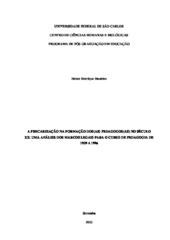| dc.contributor.author | Faustino, Heitor Henrique | |
| dc.date.accessioned | 2023-02-27T18:14:02Z | |
| dc.date.available | 2023-02-27T18:14:02Z | |
| dc.date.issued | 2023-01-25 | |
| dc.identifier.citation | FAUSTINO, Heitor Henrique. A precarização na formação dos(as) pedagogos(as) no século XX: uma análise dos marcos legais para o curso de Pedagogia de 1939 a 1996. 2023. Dissertação (Mestrado em Educação) – Universidade Federal de São Carlos, Sorocaba, 2023. Disponível em: https://repositorio.ufscar.br/handle/ufscar/17420. | * |
| dc.identifier.uri | https://repositorio.ufscar.br/handle/ufscar/17420 | |
| dc.description.abstract | The process of precarious work is a phenomenon that expands over the entirety of the social fabric, conditioning and being conditioned by numerous processes, among which we can mention the formation of subjects. Thus, we question whether it would also be possible to understand whether the process of precarious work can be identified in the legal frameworks for the Pedagogy course in the period from 1939 to 1996. To answer this question, we carried out a documentary research whose methodology was based on Discourse Analysis. We understand the phenomenon of precarious work as a condition established by capital for the working class to produce ever more, in objective, subjective and legal conditions that are increasingly deteriorated and deregulated, and receiving ever less from the sale of their workforce and/or the total amount of socially generated wealth, this condition manifests itself in different manners and forms, being articulated in the 20th century by the Taylorist-Fordist and Toyotist work management models. The results pointed to the existence of a tendency in the legislation for the Pedagogy course to follow the models of capitalist management, manifested mainly in the elements of specialization, fragmentation, polyvalence and flexibility, these elements and their unfolding during the historical development of the Pedagogy course and the work of this professional engender situations of precarious work whose aspects can still be identified in the education of the pedagogue. | eng |
| dc.description.sponsorship | Não recebi financiamento | por |
| dc.language.iso | por | por |
| dc.publisher | Universidade Federal de São Carlos | por |
| dc.rights | Attribution-NonCommercial-NoDerivs 3.0 Brazil | * |
| dc.rights.uri | http://creativecommons.org/licenses/by-nc-nd/3.0/br/ | * |
| dc.subject | Precarização | por |
| dc.subject | Pedagogia | por |
| dc.subject | Trabalho | por |
| dc.subject | Formação Docente | por |
| dc.subject | Precariousness | eng |
| dc.subject | Pedagogy | eng |
| dc.subject | Labor | eng |
| dc.subject | Teacher Education | eng |
| dc.title | A precarização na formação dos(as) pedagogos(as) no século XX: uma análise dos marcos legais para o curso de Pedagogia de 1939 a 1996 | por |
| dc.title.alternative | Precariousness in the training of pedagogues in the 20th century: an analysis of the legal frameworks for the Pedagogy course from 1939 to 1996 | eng |
| dc.type | Dissertação | por |
| dc.contributor.advisor1 | Coutinho, Luciana Cristina Salvatti | |
| dc.contributor.advisor1Lattes | http://lattes.cnpq.br/2688318704089723 | por |
| dc.description.resumo | O processo de precarização do trabalho é um fenômeno que se expande sobre a totalidade da tessitura social, condicionando e sendo condicionado por inúmeros processos, dentre eles podemos citar a formação dos sujeitos. Assim, questionamos se também seria possível compreender se o processo de precarização do trabalho pode ser identificado nos marcos legais para o curso de Pedagogia no período de 1939 a 1996. Para responder a essa questão, realizamos uma pesquisa documental cuja metodologia se baseou na Análise de Discurso. Entendemos o fenômeno da precarização do trabalho como uma condição estabelecida pelo capital para que a classe trabalhadora produza sempre mais, em condições objetivas, subjetivas e legais cada vez mais deterioradas e desregulamentadas, e recebendo sempre menos pela venda da sua força de trabalho e/ou do total de riquezas socialmente geradas, essa condição se manifesta de diferentes maneiras e formas, sendo articulada no século XX pelos modelos de gestão do trabalho taylorista-fordista e toyotista. Os resultados apontaram a existência de uma tendência nas legislações para o curso de Pedagogia em acompanharem os modelos de gestão capitalista, manifestados principalmente nos elementos de especialização, fragmentação, polivalência e flexibilidade, esses elementos e seus desdobramentos durante o desenvolvimento histórico do curso de Pedagogia e do trabalho desse profissional engendram situações de precarização do trabalho cujo aspectos podem ser identificados ainda na formação do(a) pedagogo(a). | por |
| dc.publisher.initials | UFSCar | por |
| dc.publisher.program | Programa de Pós-Graduação em Educação - PPGEd-So | por |
| dc.subject.cnpq | CIENCIAS HUMANAS::EDUCACAO::FUNDAMENTOS DA EDUCACAO | por |
| dc.subject.cnpq | CIENCIAS HUMANAS::EDUCACAO::PLANEJAMENTO E AVALIACAO EDUCACIONAL | por |
| dc.publisher.address | Câmpus Sorocaba | por |
| dc.contributor.authorlattes | http://lattes.cnpq.br/4841580715956986 | por |

